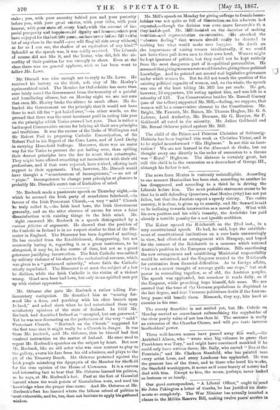Mr. Mills speech on Monday for giving suffrage to female
house- hold= was not quite so full of illustration...a& his admirers had expeetedaa-though the division was even -more. favourab'e th n they.hadahoped. Mr. alillisinsiated on the cloctriue of making taantianaand representation co-extensive. die attacked the obesure feeling" that wont en should really b3 devoted to nothing but what would make men happier. He dwelt on the importance of raising women intellectually, if we would not have them pull down men to their own level. Womea might ba-kept ignorant of -politics, but they could not be kept entirely from the most dangerous part or it—political personalities. He assumed that givingwomen a vote would involve giving them-political knowledge. And he pointed out several real legislative grievances under which women lie. But he did not touch the question of the existing political capacity of women, and, on the whole, the speech was one of the least telling Mr. Mill has yet made. He _got, however, 73 supporters, 196 voting against him, and waa left in a minority of 123. Ten Conservatives besides Mr. Russell Gurney (one of the tellers) supported Mr. Mill,—feeling, we suppose, that women will be a conservative' element in the Constitution. 'Mr. Bright, Mr. Fawcett, Mr. Baines, Mr. Thomas Hughes, Mr. G. S. Lefevre, Lord Amberley, Mr. Denman, Sir G. Bowyer, Sir F. Goldsrnid all voted in the minority. Mr. Julian Goldsmid and Mr. Bernal Osborne paired against Mr. Mill.






























 Previous page
Previous page